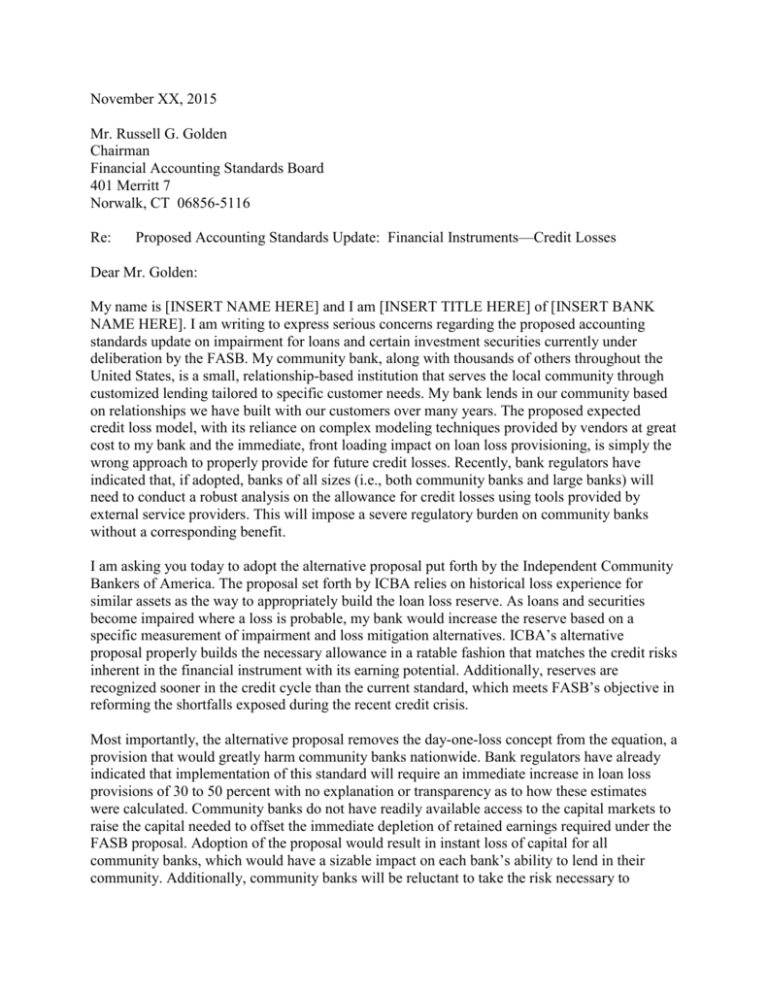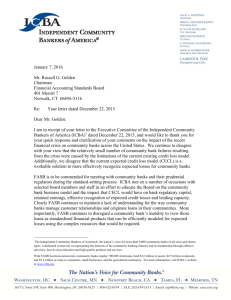November XX, 2015 Mr. Russell G. Golden Chairman Financial
advertisement

November XX, 2015 Mr. Russell G. Golden Chairman Financial Accounting Standards Board 401 Merritt 7 Norwalk, CT 06856-5116 Re: Proposed Accounting Standards Update: Financial Instruments—Credit Losses Dear Mr. Golden: My name is [INSERT NAME HERE] and I am [INSERT TITLE HERE] of [INSERT BANK NAME HERE]. I am writing to express serious concerns regarding the proposed accounting standards update on impairment for loans and certain investment securities currently under deliberation by the FASB. My community bank, along with thousands of others throughout the United States, is a small, relationship-based institution that serves the local community through customized lending tailored to specific customer needs. My bank lends in our community based on relationships we have built with our customers over many years. The proposed expected credit loss model, with its reliance on complex modeling techniques provided by vendors at great cost to my bank and the immediate, front loading impact on loan loss provisioning, is simply the wrong approach to properly provide for future credit losses. Recently, bank regulators have indicated that, if adopted, banks of all sizes (i.e., both community banks and large banks) will need to conduct a robust analysis on the allowance for credit losses using tools provided by external service providers. This will impose a severe regulatory burden on community banks without a corresponding benefit. I am asking you today to adopt the alternative proposal put forth by the Independent Community Bankers of America. The proposal set forth by ICBA relies on historical loss experience for similar assets as the way to appropriately build the loan loss reserve. As loans and securities become impaired where a loss is probable, my bank would increase the reserve based on a specific measurement of impairment and loss mitigation alternatives. ICBA’s alternative proposal properly builds the necessary allowance in a ratable fashion that matches the credit risks inherent in the financial instrument with its earning potential. Additionally, reserves are recognized sooner in the credit cycle than the current standard, which meets FASB’s objective in reforming the shortfalls exposed during the recent credit crisis. Most importantly, the alternative proposal removes the day-one-loss concept from the equation, a provision that would greatly harm community banks nationwide. Bank regulators have already indicated that implementation of this standard will require an immediate increase in loan loss provisions of 30 to 50 percent with no explanation or transparency as to how these estimates were calculated. Community banks do not have readily available access to the capital markets to raise the capital needed to offset the immediate depletion of retained earnings required under the FASB proposal. Adoption of the proposal would result in instant loss of capital for all community banks, which would have a sizable impact on each bank’s ability to lend in their community. Additionally, community banks will be reluctant to take the risk necessary to promote economic development out of fear that a sizable day-one loss will result in deterioration of capital levels. Instead of creating new proposals to force greater capital retention for community banks, FASB should focus instead on the Globally Significant Important Banks or G-SIBs that currently are far less capitalized than regional and community banks under International Financial Reporting Standards and that bring significantly greater risk to their investors and the national economy when off-balance sheet items are not reflected in capital ratios. Thank you for considering my concerns with the proposed expected credit loss model. If you have any questions or would like additional information, please do not hesitate to contact me at [INSERT PHONE NUMBER HERE] or [INSERT E-MAIL ADDRESS HERE]. Sincerely, /s/ [INSERT FIRST NAME HERE] [INSERT LAST NAME HERE] CC: Mr. Martin J. Gruenberg Mr. Thomas J. Curry Dr. Janet L. Yellen Mr. Robert F. Storch Mr. Rusty A. Thompson Mr. Steven P. Merriett


